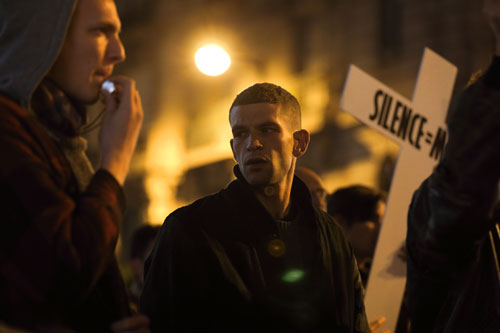Robin Campillo’s 120 Beats per Minute gets down to business with striking briskness. We’re in a lecture hall somewhere in Paris, and a meeting involving a few score young men and women is about to begin. Rules are established by a no-nonsense woman chairing the event: no clapping – because it impedes the flow of debate – and smoking is permitted (this is France after all) but only in the hallway. Introductions by new members to the group are curt, and rattled off quickly.
The haste lends this early scene a buzzy energy, but there’s a poignant undertow to the rush. Set in Paris in the early 1990s, this terrific drama is a large-canvas, richly coloured docudrama about the early members of the French branch of Act Up, the Aids activism group. The title might refer to the accelerated rhythm of a techno track on a dancefloor or a heartbeat pounding at a high tempo. In any event mortality and hedonism are two big themes here: 120 BPM is a portrait of young lives experienced in a blur of urgency.
The French government saw Aids as a disease of gay people, sex workers and drug addicts, and its support for treatment – as this film vividly reminds us – was scandalously under-resourced. Many hundreds were dying prematurely. “We don’t have time,” says one Act Up member at the meeting. He’s referring to efforts to force a drug company to release the results of a promising breakthrough drug, but the comment, of course, has wider resonance.
In a sequence of quiet devastation the movie recreates the moment activists laid their bodies in a Paris street, to simulate the swathes of people already lost to Aids
So as well as scenes from these lively meetings, Campillo chronicles the frontline protests the Act Up activists stage to shake the establishment into action. They hurl bags of fake blood at government spokesmen; they invade the corporate offices of a medical firm withholding test results.
Some of this has echoes of the activism going on in the US and elsewhere at the time, but it also connects to a uniquely French tradition of street demonstration – we hear an extract at one point from text written during the Paris Commune unrest in 1848. At times this is protest envisioned as exquisite theatrical spectacle: in a sequence of quiet devastation the movie recreates the moment when Act Up activists laid their bodies in a Paris street, to simulate the swathes of people already lost to Aids. Over these sombre visuals Campillo plays the opening refrain of Bronski Beat’s Smalltown Boy, a heartrending distillation of the film’s mix of exultant joy and deep lamentation.










